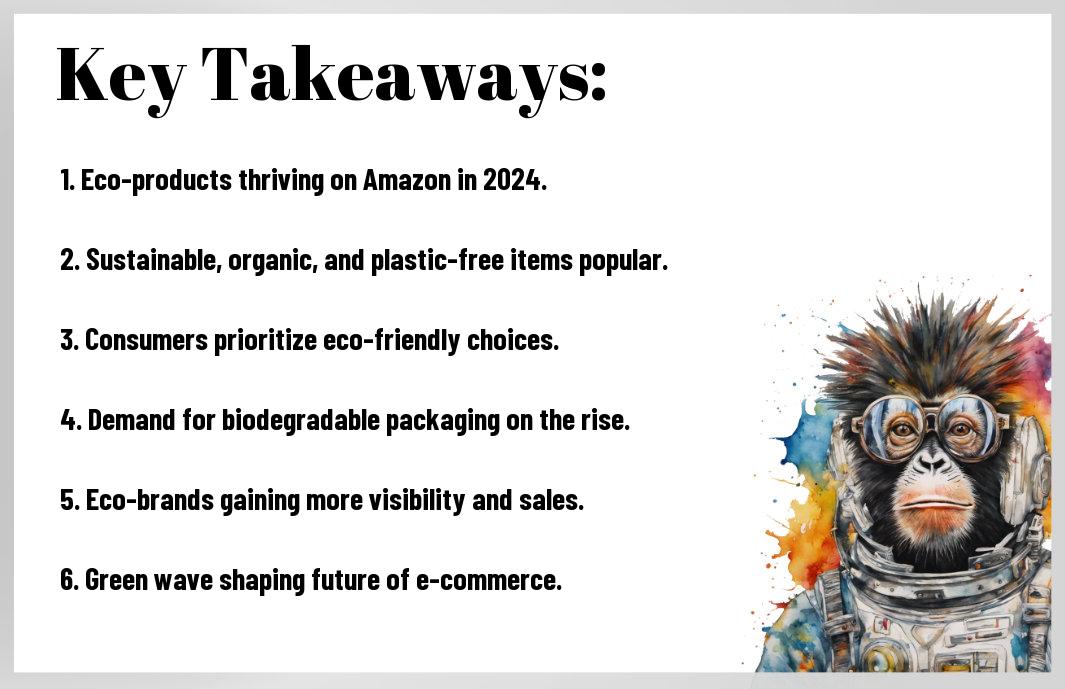With environmental consciousness on the rise, a notable shift towards sustainable eco-products has taken over the e-commerce giant, Amazon, in 2024. This significant trend indicates a growing demand for green alternatives among consumers looking to make ethical and eco-friendly choices. In this blog post, we will explore how these eco-products are not only reshaping consumer preferences but also steering the future of online shopping towards a more sustainable and environmentally conscious direction.
Key Takeaways:
- Eco-products reign on Amazon: Eco-friendly products are increasingly dominating the Amazon marketplace, reflecting a growing consumer preference for sustainable options.
- Increased demand for green alternatives: Consumers are actively seeking out environmentally friendly products, prompting sellers to prioritize sustainability and eco-friendly practices.
- Opportunities for eco-conscious brands: Eco-conscious brands have a significant advantage in the current market landscape, with a growing number of consumers actively choosing green products over traditional options.

The Green Transformation of Consumer Behavior
Shifts in Purchasing Patterns Toward Sustainability
Behavior It is evident that consumer behavior is experiencing a significant shift towards sustainability. More and more customers are actively seeking out eco-friendly products, leading to a surge in the demand for sustainable goods. This shift is not just a passing trend but a fundamental change in how people make purchasing decisions.
The Role of Social Consciousness in Product Choice
Purchasing As social consciousness continues to grow, consumers are becoming increasingly mindful of the impact their choices have on the environment and society. This awareness is shaping their purchasing decisions, with many opting for products that align with their values. Companies that prioritize sustainability and social responsibility are gaining favor among this socially conscious consumer base.
A The role of social consciousness in product choice cannot be underestimated. Consumers are not only looking for quality and affordability but also for products that resonate with their values. Companies that demonstrate a commitment to environmental stewardship and ethical practices are not only meeting consumer expectations but also gaining a competitive edge in the market. Sustainability is no longer just a buzzword but a driving force behind consumer behavior.

The Evolution of Amazon’s Marketplace
Integration of Eco-Friendly Filters and Features
Once again, Amazon has proven itself to be at the forefront of e-commerce innovation by integrating eco-friendly filters and features into its marketplace. Customers are now able to easily find and choose products that align with their values of sustainability and environmental consciousness. This not only caters to the growing demand for green products but also sets a new standard for online shopping platforms.
Success Stories of Green Products on Amazon
EcoFriendlyThe success of green products on Amazon has been nothing short of remarkable. The platform has provided a springboard for environmentally-friendly brands to reach a wider audience and make a significant impact on consumer behavior. The
It is important to highlight how these success stories showcase the growing shift towards eco-conscious consumption and the power of online marketplaces in driving sustainable practices. By featuring these products prominently, Amazon has not only boosted sales but also educated consumers about the importance of making environmentally-responsible choices.
The Impact of Eco-Products on Amazon’s Business Model
Changes in Supplier and Seller Policies
For Amazon, the rise of eco-products has necessitated significant changes in supplier and seller policies. The e-commerce giant has been enforcing stricter guidelines to ensure that products labeled as eco-friendly truly adhere to sustainable practices. Suppliers and sellers are now required to provide detailed information on the environmental impact of their products, encouraging transparency and accountability in the supply chain.
Amazon’s Initiatives for a Greener Supply Chain
For Amazon, sustainability is not just a trend but a core value driving its business decisions. The company has launched various initiatives to promote a greener supply chain, including a commitment to achieve net-zero carbon emissions by 2040. Amazon is investing in renewable energy projects, electric delivery vehicles, and sustainable packaging solutions to reduce its environmental footprint.
Plus, Amazon’s initiatives for a greener supply chain are not only environmentally responsible but also financially savvy. By embracing sustainability, Amazon is not only meeting consumer demand for eco-friendly products but also future-proofing its business against potential regulations and reputational risks associated with environmental degradation.
Marketing Strategies for Eco-Products
How Green Branding Captures Market Attention
Many eco-products are utilizing green branding to capture the attention of consumers in a crowded marketplace. The use of earthy tones, recycled packaging, and eco-friendly messaging helps eco-products stand out and appeal to environmentally conscious customers. By incorporating sustainability into their branding, companies can differentiate themselves and attract a loyal customer base.
The Power of Customer Reviews in Promoting Eco-Products
The power of customer reviews cannot be underestimated when it comes to promoting eco-products. Positive reviews from satisfied customers not only build trust and credibility but also act as word-of-mouth marketing that can significantly boost sales. In a competitive online marketplace like Amazon, where social proof plays a crucial role in purchasing decisions, glowing customer reviews can make all the difference.
On Amazon, products with high ratings and positive feedback are more likely to appear at the top of search results, making them more visible to potential buyers. This increased visibility can lead to higher conversion rates and ultimately, greater success for eco-products.
Understanding the importance of cultivating a positive online reputation through customer reviews is imperative for eco-products looking to thrive in today’s market. Encouraging satisfied customers to leave reviews, promptly addressing any negative feedback, and maintaining transparency are key strategies in leveraging the power of customer reviews to promote eco-friendly products effectively.
Challenges and Opportunities
Navigating Regulatory Hurdles and Certifications
All eco-products face a myriad of regulatory hurdles and the need for certifications to prove their environmental claims. From packaging materials to production processes, manufacturers must navigate a complex web of rules to ensure their products meet necessary standards. This not only adds to the cost of production but also requires a deep understanding of local and international regulations.
Future Directions for Eco-Products on E-commerce Platforms
An exciting opportunity lies ahead for eco-products on e-commerce platforms. As consumer awareness and demand for sustainable products continue to rise, there is a growing market for environmentally friendly offerings. E-commerce platforms are well-positioned to cater to this demand by providing a wide range of eco-friendly products to a global audience.
Platforms need to capitalize on this trend by not only increasing the visibility of eco-products but also by ensuring that these products are easily accessible and distinguishable from traditional alternatives. Offering certification information, eco-friendly packaging options, and promoting sustainable practices among sellers can go a long way in establishing e-commerce platforms as leaders in the green movement.
To wrap up
Presently, eco-products are dominating Amazon in 2024, reflecting a significant shift towards sustainability in consumer behavior. With the rise of environmentally conscious shoppers, brands that prioritize eco-friendly practices and products are reaping the benefits by standing out in the competitive market. As more consumers become aware of the environmental impact of their purchases, the demand for green products is expected to continue to rise. In order to remain competitive and meet consumer expectations, businesses will need to adapt to this green wave by incorporating more sustainable practices into their operations. The trend of eco-products dominating e-commerce platforms like Amazon is not just a passing phase but a glimpse into the future of retail where sustainability plays a key role in shaping consumer preferences and purchasing decisions.

